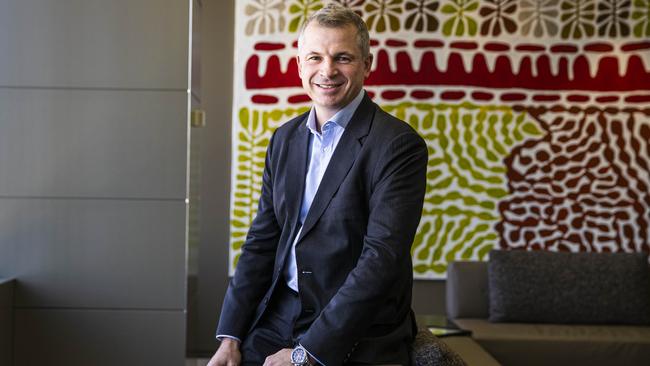Covid pandemic disruptions set a new precedent for law firms
A reopening economy with high vaccination rates makes a mass return to work possible, but for law firms that is not likely.

Law firms are bracing for a year of uncertainty in which the professional and industry consequences of the Covid-19 pandemic, lockdowns and changed work patterns will come into sharper focus.
“The great resignation” is a debatable concept, but many are already experiencing volatility in partner and staff numbers, fuelled by an increase in the already intense competition for talent.
That battle was exacerbated by travel bans that locked out replenishing stocks of overseas lawyers and locked in the domestic workforce. With borders about to lift, the to and fro among lawyers will add to the churn.
Flat average growth of 1.16 per cent in full-time equivalent partner numbers for the six months to January 2022 was accompanied by 2.82 per cent growth in female partners, The Australian’s legal partnership survey conducted by Eaton Strategy + Search shows.
These trends are occurring against the backdrop of strong business confidence and average profit growth of 12.1 per cent for the year to June 30, more than double expectations, as revealed in The Australian’s exclusive report of recent Commonwealth Bank data which also showed talent acquisition would be the biggest problem.
A rise in costs across the board will be driven partly by the need to offer competitive remuneration, as well as the resumption of business travel.
The Australian’s legal partnership survey covered 41 firms, of which three were first-timers, resulting in comparative data for 38. Most of the firms with more than 100 FTE partners registered growth. However, at Minter Ellison, where there was a drop of 2.3 per cent, chief executive and managing partner Virginia Briggs conceded that they were “experiencing heightened competition”. At Herbert Smith Freehills, with a flat result down 0.07 per cent, executive partner Australia and Asia Andrew Pike acknowledged “a strong labour market” expected to continue “for some time”.
Maddocks chief executive David Newman called the potential movement of personnel the “great opportunity”; at Hall & Wilcox, managing partner Tony Macvean opted for “the great transition”. Gadens chief executive for Melbourne and Sydney Mark Pistilli called it the “great transfer”. “Sure some people will leave the industry, but many will move within it,” he said. “That means there will be winners and losers, and we want to be one of the winners.”
Sector leaders are clear about the magnitude of that task.
“As we emerge from the pandemic we are seeing global mobility take off, and a growing number of professionals reassessing what is important to them for their careers and lifestyles,” Ashurst global chief executive Paul Jenkins said.
Baker McKenzie managing partner Antony Foley noted “higher demand and fierce competition for legal talent in the current market”, while Clayton Utz chief executive partner Bruce Cooper said it was natural that with borders opening and the resumption of international travel “we can expect to see people exploring overseas opportunities”.
“That’s always been a challenge for law firms, particularly at that two-to-five year level,” Mr Cooper said. “Retaining and attracting the right people will be our biggest challenge as the world opens up again.”
Norton Rose Fulbright Australia chief executive partner Alison Deitz took a positive view. “There is a lot of Australian legal talent who have been stuck in countries that have had a tougher pandemic than we have,” Ms Deitz said. “What we can offer them is the continuation of their global experience back home. The opening of borders also allows us to get back to international secondment rotations, which are really attractive to our younger lawyers.”
McInnes Wilson managing partner Paul Tully said: “If the ‘great resignation’ does happen there will be a lot of talent in the market. We do not foresee any difficulty in retaining our current talent and attracting new talent.”
Most firms surveyed recognised that the traditionally office-bound life of a lawyer is under serious threat, and enticements must go beyond attractive salaries.
King & Wood Mallesons Australia outgoing chief executive partner Berkeley Cox said the pandemic had brought about “a once-in-a-generation change in how, when and where people choose to work and, for some, a desire to reassess their priorities around the place they want to work”. “In-house legal departments and firms in local and offshore markets are actively seeking to recruit our people,” Mr Cox said.

“People are seeking a strong sense of purpose including in support of communities, greater flexibility, opportunities for growth and professional development on many dimensions, in addition to first class work, a supportive supervisor and competitive remuneration.”
While some firms expected a strong return to the office next year, such as Ashurst (hoping for all personnel) and Swaab (87.4 per cent), most said flexible working – in some cases already in operation before the pandemic – would continue.
“Almost all our people are working in a hybrid pattern and we expect that to continue, with a mix of in-office and remote working,” Allens managing partner Richard Spurio said. “How that plays out in each office, across different days and for different individuals, varies.”
Gilchrist Connell managing principal Richard Wood expected that “the long periods working from home will influence how our people work into the future”.
The question of an appropriate balance brought varied answers. “We are encouraging people to work more than 50 per cent of their working week in the office where possible,” Mr Wood said. At Gilbert + Tobin, a recent survey of personnel showed 70 per cent would prefer two or three days working remotely. “We expect that most of our people will choose to be in at least two days per week, with the office having around 70 per cent occupancy on any given day,” chief operating officer Sam Nickless said.
The attitude to office attendance looms as a deal-breaker for talented lawyers in demand. “Flexibility is often the first question we get at interview, and we want to lead the market in making it work for our people, our clients and our teams,” Gadens’ Mr Pistilli said.
This was echoed by Sparke Helmore head of talent Nicole Garrett. “Throughout our recruitment process we are seeing prospective talent asking questions around our values, vision, leadership, reputation, culture and most importantly for them flexibility, which is now no longer seen as a benefit but an expectation,” Ms Garrett said.
Lander & Rogers managing partner Genevieve Collins said the ability to work flexibly and remotely was critical. “I don’t anticipate we’ll ever go back to working full-time from the office,” she said.
Other incentives to retain the best performers and attract new ones include pay rises, better parental and other leave, and making the office a desirable place. MinterEllison will be co-designing a hybrid, flexible workplace with all partners and staff.
Wotton & Kearney chief executive partner David Kearney said time-out leave for lawyers, recharge days for support staff and ‘‘thinking of you’’ gifts had originated during the pandemic but would “continue in the post-pandemic world”.






To join the conversation, please log in. Don't have an account? Register
Join the conversation, you are commenting as Logout